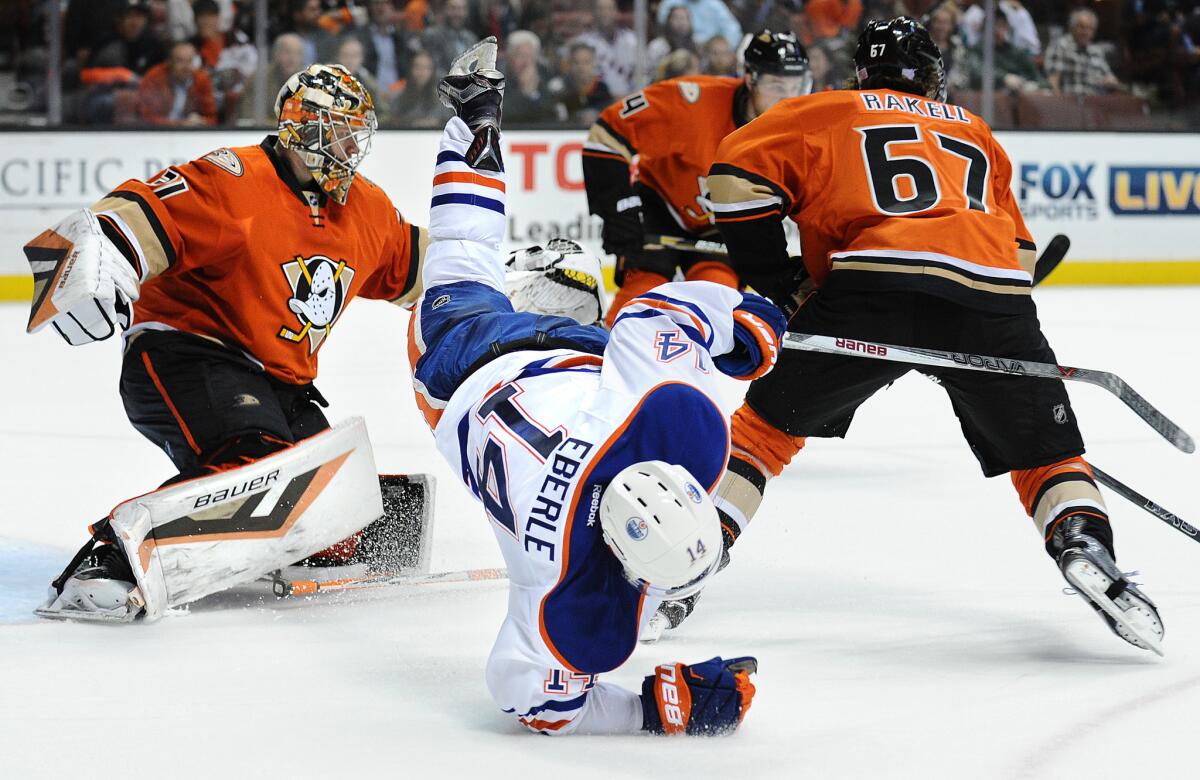What we learned from the Ducks’ 4-3 overtime loss to the Oilers

Oilers right wing Jordan Eberle is upended as he skates through the crease against the Ducks on Wednesday night.
- Share via
The Ducks lost a lead, actually three, and lost in the high-risk nature that is three-on-three overtime.
Rinse and repeat.
It’s happened for two consecutive games, the last to Edmonton on Wednesday. The Ducks still extended their point streak to six games (4-0-2) in their climb out of the Pacific Division basement, but they have some kinks to work out.
Here’s what we learned:
The Comeback Kids are so last season
Anaheim set an NHL record last season with 18 wins when trailing at any point in the third period. That’s why it seemed so atypical to see them losing leads in two straight games - a 2-0 lead to Arizona on Monday and three one-goal leads to Edmonton.
Ducks Coach Bruce Boudreau didn’t put much stock in it.
“Well, it’s not like they’re blowing three-goal leads,” Boudreau said. “It’s a one-goal lead. One shot in this game. You’d like to be able to think you can defend the lead, when you get the lead, but at the same time, it’s not like they’re coming back from a 3-0 deficit in the third period.”
The overtime format is tricky
No one questions that the three-on-three play for overtime has increased fan interest and reduced shootouts, but it also has some wrinkles that belie basic tenets of hockey, such as being responsible in your own zone.
Edmonton’s Teddy Purcell was so far behind the defensive play he was sprung for a breakaway. Of course, the play started with a pass from goalie Anders Nilsson. In other words, the playground rules apply.
“It’s man-on-man,” Boudreau said. “We can simply say it’s man-on-man. If they’ve got the puck you’ve got to play above your man. That’s the rule.”
The latest top-line combination has possibilities
Boudreau put Rickard Rakell at left wing with Ryan Getzlaf and Corey Perry, an odd move because Rakell is entrenched as their No. 3 center. Boudreau didn’t want to break up the other lines that were successful during Rakell’s three-game absence, and for the most part it worked.
Rakell got two assists and had a lot of energy. He played a season-high 18:54 minutes with four shots.
“I was just excited,” he said. “[I just tried not to] change anything, really, from what I do out there. Just try to be open and create chances.”
DUCKS UP NEXT
vs. N.Y. ISLANDERS
When: Friday, 7 p.m.
On the air: TV: Prime; Radio: 830.
Update: The experiment with Rickard Rakell on left wing with Ryan Getzlaf and Corey Perry could get a longer look. They were together in power-play drills Thursday, and Ducks Coach Bruce Boudreau said Rakell is a welcome change of pace from other power forwards they have put with Getzlaf and Perry. “They’ve had the big, hulking line — now they’ve got a real good skilled player, and playing with him did a lot [Wednesday] for that line,” Boudreau said. The Ducks will try to keep their six-game (4-0-2) point streak going in the homestand finale before they leave for a four-game trip. They will have to go longer without left wing Jiri Sekac, who is expected to miss another two weeks, the Ducks announced. Sekac was still on crutches and his sprained ankle is more serious than initially thought. Islanders center John Tavares has four goals, including three on the power play, and four assists in eight career games against the Ducks.
More to Read
Go beyond the scoreboard
Get the latest on L.A.'s teams in the daily Sports Report newsletter.
You may occasionally receive promotional content from the Los Angeles Times.











